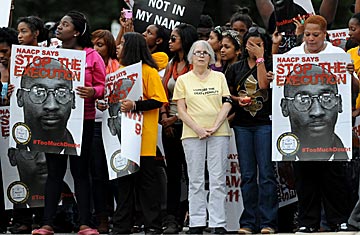
Demonstrators protest the scheduled execution of Troy Davis at the Georgia Diagnostic and Classification Prison in Jackson, Ga., on Sept. 21, 2011
Anneliese McPhail believes what so many others doubt: not only that Troy Davis did in fact murder her son Mark back in 1989, but that Davis' execution was a long-overdue punishment that will help bring peace to her and her family. So on Wednesday night she was in the odd and unenviable position of grieving one murder while being accused by some of inciting another.
As alien as her predicament is to me — and as little as I agreed with her stance on Davis' execution — when I reached McPhail on the phone hours before the execution, there was something familiar about her: her slight accent. I thought it was German, maybe even from Berlin, where I used to live. Turns out the hunch was right — which is how we ended up talking not just about her son or Davis but also about Zehlendorf, the leafy southwestern district of Berlin where we have both lived: she grew up there before she met Mark's father, a U.S. serviceman from Georgia. We talked mostly in German; she took to it almost with relief, as if speaking in her mother tongue were a comfort on a day when she felt so misunderstood by so many.
I still do not think Davis should have been executed. As I argued on Tuesday, his case was, from the outset, a legal minefield of recanting witnesses, remorseful jurors and a glaring lack of physical evidence. The death penalty, if we must have it, should be reserved for suspects whose guilt is simply undeniable.
You don't need to share memories of Berlin with McPhail to feel her pain, of course. But what should anyone make of this sweet, broken 77-year-old from Zehlendorf, or any other victims' relatives who ask for the ultimate punishment?
Some activists have made their opinions clear. "I've been getting nasty calls," McPhail told me, and as if on cue, just a few minutes after we hung up, a University of Alabama freshman posted on Twitter: "Made a phone call to Anneliese McPhail. She is bitter and hateful." And then, from the same student: "If you really care about the pain of losing a child, wouldn't you feel some pain for his mother? Who is Troy Davis? A son."
NPR asked Davis' sister Martina Davis-Correia, who has been a lion in defense of her brother, about the McPhails. "Their family is never going to find justice," she said. "Killing Troy is not going to help anything."
The idea that the death penalty could in fact bring closure to victims' survivors (who are known in the literature as co-victims) seems debatable, and indeed a few people have subjected it to academic rigor. The first and perhaps most significant finding is that closure as a justification for capital punishment is a relatively new concept. University of California, Berkeley, law professor Frank Zimring found that the media never used the word closure in a death-penalty context before 1989 (the year, coincidentally, that McPhail was gunned down in a Savannah, Ga., parking lot). In a University of Louisville study published this year, sociology graduate student Thomas Mowen and his professor Ryan Schroeder tracked the emergence of the argument that the death penalty — preferably with minimal appeals — would bring closure to the families of the victims.
"The term closure wasn't used in any meaningful document until '91 or '92," says Schroeder. "That's when we really saw the move away from arguments about deterrence and cost savings." As those rationales for the death penalty became discredited, survivors and their need for closure were pushed to center stage.
There are two problems with that, says University of Miami professor of law Susan Bandes. "First," she says, "there's no psychological concept or syndrome that everyone agreed on called 'closure,' " she says. For some people, closure means just finding out who committed the crime. For others, it's knowing why it happened or answering the dark questions of what the victim's last moments were like (when I asked McPhail about this, she said the allegation that Davis shot her son once and then went back to "execute" him upset her more than any other revelation). For still others, closure might refer to getting the criminal-justice system to react, to show that it took the murder seriously.
